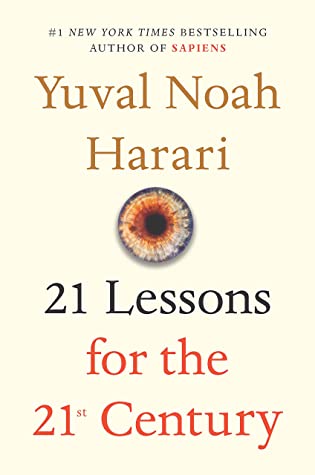21 Lessons for the 21st Century
Date read September 19, 2020
How much I recommend: 6/10, Go to Amazon or Goodreads for other reviews
- First of all, these are not lessons at all, just views of a mixed dystopian future ahead of us. And the most important thing is, these are authors estimations about our future. Let me tell you one thing that Harari does not tell directly, humans are really but really bad at estimation. So, read the book with a grain of salt.
- The book was not cohesive, mostly a mishmash of ideas scattered. It starts with liberalism, then ventures into areas like nationalism, religion, secularism and then ends with meaning of life and meditation.
- Being a software engineer myself, I really found the threats we're facing with big data and machine learning a bit exaggerated. Compared to these technological dangers, he should have brought the ecological dangers to the fore.
- Furthermore I don't agree with the notion that data will be much more important than land and machinery in 21st century. Land will always be more important and if you're not convinced, take a look at the rising sea levels and what will happen to the people living in the to-be effected regions. Also you can take a look at the property prices in London.
- Bashing Facebook sounded nice 5 years ago but making them the straw man is not solving our data and privacy issues. He could have also discussed good things like GDPR and California's equivalent of the data privacy laws which are progressive movements in terms of these issues.
- The start of the book is all about Liberalism and its narrative which is weird because there's no way to point that this exact ideology is in place in anywhere in the world at the moment. There are variants of it, you might say. But the real question is the future of democracy and capitalism. If the author worked on that, that'd be a bit better.
- Chapters on War, Terrorism and Immigration are unfortunately shallow. Harari claims that war is more or less a solved problem whereas it is a current threat/problem to the world and is fuelling the problem of Immigration anyway (and it was on the TV every day until the Covid 19 crisis came along). Chapter on Terrorism is unfortunately too much inspired from (Harari's compatriot) Daniel Kahneman's work on the subject.
- I definitely prefer the middle chapters to first and last. I especially liked the parts about Secularism and how religion and nationalism (obvious but anyway) would not be able to solve the real dangers we are facing with the world.
- Harari also has nice opinions about sense of justice and post truth which are based on his earlier works about how Sapiens is not very good with large numbers and scales.
- End of the book was a bit meh to me, the chapter about meaning was kind of a cliche although well written and the final chapter about meditation is simply wtf?
 21 Lessons for the 21st Century
21 Lessons for the 21st Century